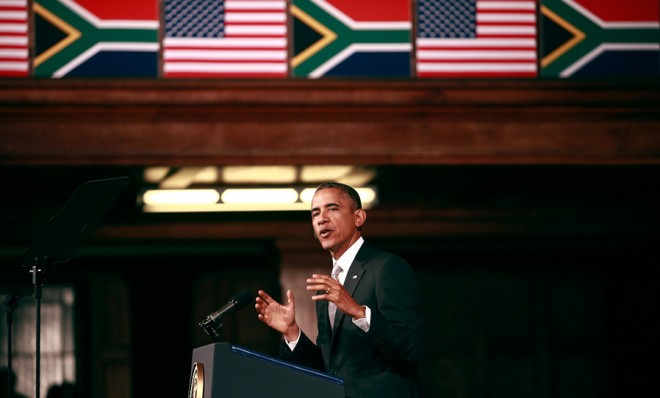Obama's ambitious plan to fuel an African energy boom
The U.S. government is eyeing initiatives ranging from wind power to soccer balls that generate electricity

A free daily email with the biggest news stories of the day – and the best features from TheWeek.com
You are now subscribed
Your newsletter sign-up was successful
This week, President Obama introduced his administration's "Power Africa" initiative in a speech in Cape Town, South Africa, which calls for $7 billion in U.S. aid and $9 billion in private pledges to bring electricity to more than 20 million households and businesses in sub-Saharan Africa.
Obama claimed that the plan will be a "win-win" for both America and Africa as it's rolled out over the next five years.
"Families get to electrify their homes; businesses can run their plants; investors can say if we locate in an African country, that they’re going to be able to power up in a reliable way," said Obama. "All this will make economies grow.”
The Week
Escape your echo chamber. Get the facts behind the news, plus analysis from multiple perspectives.

Sign up for The Week's Free Newsletters
From our morning news briefing to a weekly Good News Newsletter, get the best of The Week delivered directly to your inbox.
From our morning news briefing to a weekly Good News Newsletter, get the best of The Week delivered directly to your inbox.
"The investments made here, including in cleaner energy, means more exports for the U.S. and more jobs in the U.S," Obama claimed. And when Africa is powered, we will "have somebody to trade with and sell iPods to, and airplanes, and all kinds of good stuff."
See? Everyone wins. So what's the plan? Africa is a vast continent brimming with energy resources — some green, others not so much. (South Africa, for example, gets 93 percent of its energy from coal). Here are three projects already in play:
The Jubilee oil field
About 40 miles off the coast of Ghana, the Jubilee oil field contains more than one billion barrels of oil and huge reservoirs of natural gas. Tullow Oil has a 35.5 percent stake in the field, from which it pulls between 110,000 and 115,000 barrels of oil a day.
A free daily email with the biggest news stories of the day – and the best features from TheWeek.com
But it's the gas that will likely play a leading role in the "Power Africa" plan. "Ghana is hoping to produce around 140 million cubic feet of natural gas daily from the Jubilee field," says Reuters. Leading that initiative is General Electric, which has emerged as a principal partner in the Obama administration's plan.
"In late June G.E. signed a tentative deal with the government of Ghana to build a 1,000 mw power plant," says Christopher Helman at Forbes. "This plant would likely be fueled with natural gas sourced from the Jubilee offshore field."
Kenyan wind
Kenya, where 85 percent of the population lacks access to electricity, is "set to receive hundreds of millions of dollars in U.S. and corporate funding" through the plan, says Africa Review. As part of the $9 billion private investors have pledged to the program, Harith General Partners is spending $70 million on wind energy in Kenya, according to the White House.
The "soccket ball"
While touring a power plant in Tanzania with President Jakaya Kikwete, Obama took a moment to show off his soccer skills using a "soccket ball," an electricity-generating toy created by two Harvard graduates. The soccket ball looks and works like a regular soccer ball, but has an electric generator inside of it that collects and stores energy as it's kicked around. Just 30 minutes of play equals several hours of powering lights and cell phones. The U.S. government is distributing the balls throughout Africa.
"It’s more a gimmick than a solution," says Helman. "But every little bit helps."
Carmel Lobello is the business editor at TheWeek.com. Previously, she was an editor at DeathandTaxesMag.com.